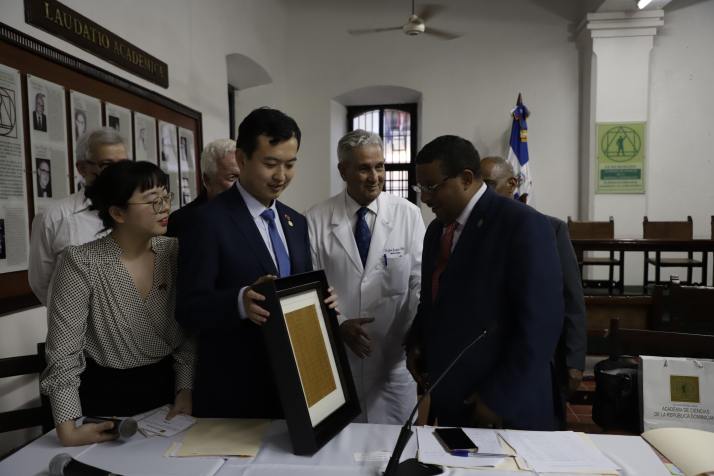| World |
| Greater exchange and collaboration with LAC countries | |
|
|
 Chen Taotao (right), head of the Tsinghua University Latin America Center, interactes with diplomats from Latin American and Caribbean (LAC) countries at a round table discussion during the LAC Ambassadors Convening at Tsinghua University event in Beijing on June 18 (COURTESY PHOTO)
In August 2023, Li Guangpu, a Ph.D. candidate researching automation at Tsinghua University in Beijing, along with 11 other Tsinghua students, embarked on an academic exchange program to the Dominican Republic in the Caribbean Sea. Recounting the four-day visit, Li told Beijing Review that the experience they gained there built a foundation for their future endeavors in Latin American and Caribbean (LAC) countries. "Dominicans' enthusiasm and easy-going personalities have left a deep impression on me, as has their eagerness to learn more about China," Li said. "We received the friendliest welcome since day one. Owing to the geographical remoteness and the rather short diplomatic relationship, we (peoples from China and the Dominican Republic) know little about each other. But everywhere we went, people greeted us with cheers and claps as loud as thunder." The Dominican Republic is the largest economy and the top destination for foreign investment and foreign tourists in the Caribbean region, and has been one of the fastest growing Caribbean economies in recent years. It established diplomatic relations with China in May 2018. During their stay in the Dominican Republic, the Tsinghua students visited the Ministry of Higher Education, Science and Technology, the Ministry of Youth, the Academy of Science, higher education institutions, and tourist attractions. They also attended a forum on future opportunities for cooperation between China and Caribbean countries under the China-proposed Belt and Road Initiative. The initiative aims to boost connectivity along and beyond the ancient Silk Road routes. The forum was co-hosted by the Chinese Embassy in the Dominican Republic, the Tsinghua University Latin America Center, the Dominican Ministry of Higher Education, Science and Technology, and the University of the Caribbean. At the event, Li delivered a presentation on China's progress in artificial intelligence and how they could be applied to the Dominican Republic's main industries. "I believe the mutual trust and understanding we built with local people will contribute to further cooperation in multiple fields between the two countries," he said.  Li Guangpu (center), a student at Tsinghua University, presents scientists from the Academy of Science of the Dominican Republic a replica of ancient Chinese multiplication table during a visit to the Caribbean country in August 2023 (COURTESY PHOTO)
Enhanced cooperation The Tsinghua delegation was invited to undertake the trip by Miguel Mejía, Minister of Political and Regional Integration of the Dominican Republic, who visited the university in March 2023. Mejía gave a speech at Tsinghua, in which he expressed hopes of enhancing cooperation with China in education, science and technology, culture, economics and trade, and underlined the role of young people in this process. "Tsinghua is the first Chinese mainland university to have students visiting the Dominican Republic," Li said, adding that the university's persistent efforts and abundant resources have led to great achievements in cooperation with LAC countries. In December 2018, Tsinghua set up the Tsinghua University Latin America Center in Santiago, Chile, aiming to promote exchange between higher education institutions of China and LAC countries and to serve as a think tank for government organizations and enterprises. To facilitate communication between China and LAC countries, Tsinghua has also hosted the annual LAC Ambassadors Convening at Tsinghua University event since 2021. This year, ambassadors and other representatives of over 10 LAC countries, including Brazil, Chile, Argentina and Uruguay, met at the Tsinghua campus on June 18. "Tsinghua has attached increasing significance to our student's competence to engage in international dialogue and communication," Chen Taotao, head of the Tsinghua University Latin America Center, told Beijing Review. "Therefore, we have launched courses introducing LAC countries, and have invited LAC diplomats to share their insights into China-LAC relationships with our students." In 2023, nine groups of Tsinghua students visited LAC countries, and this year, bilateral student exchanges are themed on poverty alleviation, which encourages students from Tsinghua and universities in LAC countries to find out the causes of and solutions to poverty in the areas where they conduct field investigations, according to Chen. "Some [Tsinghua] students have already established partnerships with students from LAC countries and want to share China's experiences in poverty alleviation with them, and to become a bridge between impoverished regions in these countries and China's government-backed and private aid programs," she added. Future perspectives "This is the fourth time I have come to Tsinghua to attend this event," Fernando Lugris, Uruguayan Ambassador to China, said at the conference. "This year's topic—China's investments and the development of LAC countries—comes at a great time, since China is a crucial partner of Latin America's development in financing, trade and education. China's development will open new doors for our country in the future." Since 2018, China has become the second largest trading partner of the LAC region as a whole, and the LAC region is the second largest destination for China's outbound investment. "I look forward to more collaboration with China in more fields and with higher quality, especially in science and technology," Lugris added. "Last year, the trade volume between China and LAC countries exceeded $489 billion, which was 39 times that of 2000. China is the largest trading partner of LAC countries including Brazil, Chile and Peru, and the first China-LAC direct passenger flight route has been launched recently," Cai Wei, Director General of the Department of Latin American and Caribbean Affairs of the Ministry of Foreign Affairs of China, said at the event. "Even though some countries have disparaged China's efforts as neocolonialism in order to dissuade LAC countries from further collaborating with China, China and LAC partners maintain the belief that our cooperation is based on mutual trust and has yielded mutually beneficial results," Cai added. "China's artificial intelligence technology has great potential to boost the development of the tourism, agriculture, mining, transportation and logistics industries in the Dominican Republic," Li said, "In my presentation [at the forum in the Dominican Republic last August], I talked about how the technology has been widely applied in China, such as drone monitoring of crops, the intelligent mining systems developed by tech titan Huawei, and automatic packaging on logistics lines. The audience was thrilled to cooperate with us in these fields." During a roundtable discussion at the June 18 event in Tsinghua, the LAC participants raised many questions with Chen regarding Chinese companies' concerns about investing in LAC countries, the approach to achieving shared benefits on both sides, and the potential fields that Chinese enterprises are interested in. "China has been investing in the fields including manufacturing and infrastructure development for a long time, and will continue to explore future opportunities," Chen explained. "For example, I know that some clean energy projects built by Chinese enterprises are already operational in Brazil. Clean energy and new-energy vehicles are very promising fields for future cooperation between China and LAC countries." Chen also believes China's experience in increasing accessibility of education and accelerating industrial transformation will be helpful for many LAC countries. "China has come a long way in improving its attractiveness to foreign investment, transitioning from cheap labor to well-educated employees," Chen said. "Many Chinese enterprises operating in LAC countries are actively implementing wellbeing improvement programs there, helping local people with training programs, which I believe will benefit their development in the long run." Copyedited by G.P. Wilson Comments to zhangyage@cicgamericas.com |
|
||||||||||||||||||||||||||||||
|
